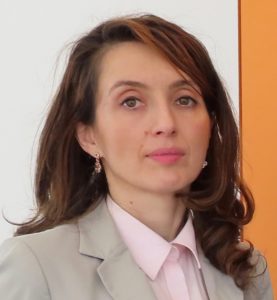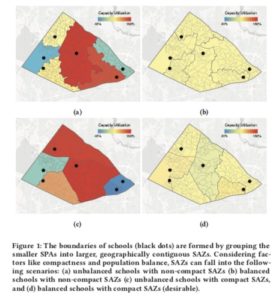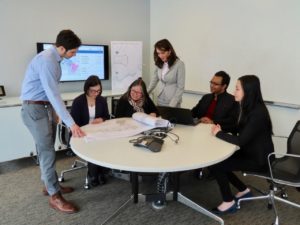Congratulations to Sanghani Center’s 2024 Spring Graduates

Virginia Tech’s week of commencement ceremonies is underway! The Graduate School Commencement ceremony was held Wednesday, May 8; the main ceremony is being held today, Friday, May 10; and the Washington, D.C. area ceremony will be held on Sunday, May 12.
“Graduation is always a bittersweet time for faculty as we applaud our students’ accomplishments,” said Naren Ramakrishnan, the Thomas L. Phillips Professor of Engineering in the Department of Computer Science at Virginia Tech and director of the Sanghani Center for Artificial Intelligence and Data Analytics. “We very proud of all of them but saying good-bye is not so easy and we are always happy when they stay in touch – as many of them do — to let us know where their research is leading them.”
The following Sanghani Center students are among those who are receiving degrees:
Ph.D. Graduates
Abdulaziz Alhamadani, advised by Chang-Tien Lu, has earned a Ph.D. in computer science. His research interests mainly focus on developing efficient and applicable methods of training machine learning models for real-world applications such as pandemic prediction, drug overdose crises, and crisis management in various industries. His additional research areas include natural language processing, such as text classification and building large corpora for low-resource languages, machine learning ethics, and event detection.The title of his dissertation is “Integrated Predictive Modeling and Analytics for Crisis Management.” Alhamadani has joined the Computer Science Department at Florida Polytechnic University as an assistant professor.
Lulwah AlKulaib, advised by Chang-Tien Lu, has earned a Ph.D. in computer science. Her research focuses on social media analysis, machine learning, and natural language processing with a special interest in Arabic. The title of her dissertation is “Analyzing Networks with Hypergraphs: Detection, Classification and Prediction.” AlKulaib has joined Kuwait University as an assistant professor in computer science.
Hongjie Chen, advised by Hoda Eldardiry, has earned a Ph.D. in computer science. His research lies in the areas of graph neural networks, time-series analysis, and recommendation systems. The title of his dissertation is “Graph-based Time-series Forecasting in Deep Learning.”
Jiaying Gong, advised by Hoda Eldardiry, has earned a Ph.D. in computer science. Her research focuses on multisource machine learning and natural language processing. The title of her thesis is “Few-Shot and Zero-Shot Learning for Information Extraction.” Gong will join coreAI, eBay, in New York City, as an applied researcher.
Jianfeng He, advised by Chang-Tien Lu, has earned a Ph.D. in computer science. His research focus on computer vision centers on guided image editing. He also focuses on natural language processing, studying uncertainty analysis in its applications (e.g., text classification, few-shot learning, named entity recognition, and text summarization). The title of his dissertation is “Uncertainty Estimation in Natural Language Processing,” for which he received the Department of Computer Science Achievement Award for Best Ph.D. Research. In June, He will join Amazon as an applied scientist in Seattle, Washington.
Ola Karajeh, advised by Edward Fox, earned a Ph.D. in computer science. Her research interests are graph machine learning, natural language processing, Twitter analysis, and public health. The title of her dissertation is “Improving Text Classification Using Graph-based Methods.”
Andreea Sistrunk, advised by Naren Ramakrishnan, has earned a Ph.D. in computer science. Her research interest is in human-computing Interaction with all forms that data science takes in information processing and its impact on society. She is equally interested in education and methods leveraging the state of the art in pedagogy and andragogy in computer science, advanced math, and engineering. The title of her dissertation is “Designing Human-Centered Collaborative Systems for School Redistricting.” Sistrunk will continue her work with the Geospatial Research Laboratory in the Washington, D.C. area, as a physical research scientist.
Master of Science Degree Graduates
Cho-Ting (Amanda) Lee, advised by Naren Ramakrishnan, has earned a master’s degree in computer science. Her research interests are in data mining and machine learning, with a focus on trade data analytics and anomaly detection. The title of her thesis is “Can an LLM find its way around a spreadsheet?”
Jiayue Lin, advised by Chris North, has earned a master’s degree in computer science. His research focus is on visual analytics and artificial intelligence, with a particular interest in refining deep learning-based image projections using semantic interaction methods. The title of his thesis is “ImageSI: Semantic Interaction for Deep Learning Image Projections.”
Daniel Palamarchuk, advised by Chris North, has earned a master’s degree in computer science. His research focuses on visualizing temporal text, document, and topic data using pre-transformer embedding methods. The title of his thesis is “Temporal Topic Embeddings with a Compass.” Palamarchuk will work as a programming teacher in the Northern Virginia area and plans on pursuing a Ph.D.
Ramaraja Ramanujan, advised by Edward Fox, has earned a master’s degree in computer science. His research focuses on data analysis of geospatial and administrative data, conducting statistical verifications and simulations, and visual analytics. The title of his thesis is “Improving Rainfall Index Insurance: Evaluating Effects of Fine-Scale Data and Interactive Tools in the PRF-RI Program.” Ramanujan will join Microsoft in Redmond, Washington, as a software engineer.
Chia-Wei Tang, advised by Chris Thomas, has earned a master’s degree in computer science. His research focuses on the development of misinformation detection utilizing multimodal reasoning. The title of his thesis is “M3D: MultiModal MultiDocument Fine-Grained Inconsistency Detection.” Tang is joining Juniper Networks in Sunnyvale, California, as a software engineer.
Lemara Williams, advised by Chris North, has earned a master’s degree in computer science. Her research centers around visualizing changes in projections over time. The title of her thesis is “TimeLink: Visualizing Diachronic Word Embeddings and Topics.” Williams will continue her studies and is beginning a computer science Ph.D. program in the Fall at the Washington University in St. Louis.
Xiaona Zhou, advised by Ismini Lourentzou, has earned a master’s degree in computer science. Her research focuses on the applications of data science and machine learning. The title of her master’s thesis is “Hierarchical Bayesian Dataset Selection.” Zhou will be pursuing a Ph.D. in computer science at the University of Illinois Urbana-Champaign.



